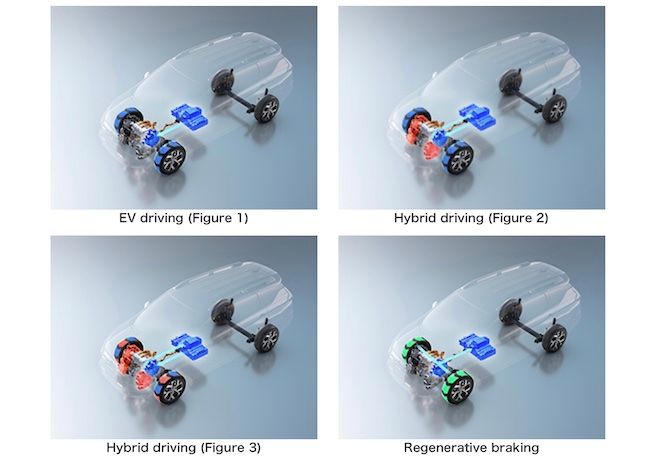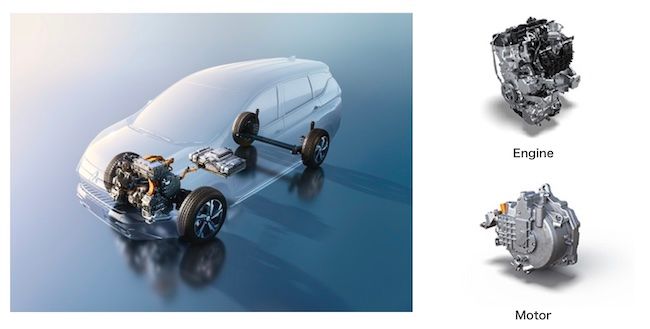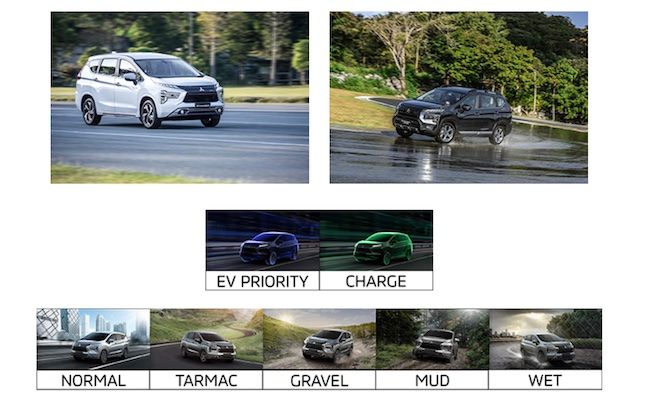
TOKYO, Feb 1, 2024 – (JCN Newswire via SeaPRwire.com) – Mitsubishi Motors Corporation (hereafter, Mitsubishi Motors) announced that new hybrid electric vehicle (HEV) models of the Xpander and Xpander Cross crossover MPVs made their global debut and went on sale in Thailand today. The HEV models are produced at the Laem Chabang Plant of Mitsubishi Motors (Thailand) Co., Ltd., a local production and sales company in Thailand.
The Xpander is a crossover MPV that combines the comfort and versatility of an MPV with the bold styling and road performance of an SUV. After its debut in Indonesia in 2017, it was subsequently rolled out in the ASEAN region, Latin America, the Middle East, and other markets, with the Xpander Cross added in 2019 as the top variant of the series. Driving the growth of the company as a global strategic model, the Xpander series sold over 130,000 units1 globally in fiscal year 2022, which was third-highest of all Mitsubishi models behind the Triton2 and Outlander.
The newly-added HEV models combine Mitsubishi Motors’ trademark electrification and all-wheel control technologies to raise the appeal of the Xpander series to another level. Newly developed based on the brand’s plug-in hybrid electric vehicles (PHEVs), the HEV system delivers an eco-friendly and exhilarating driving experience unique to electrified vehicles. In addition, Active Yaw Control and other all-wheel control technologies complement the two-wheel drivetrain to enable safe, secure driving at will, and a variety of drive modes provide optimal driving on any road surface and in any weather condition. Moreover, drivers can actively choose EV driving according to the situation, such as driving in quiet residential areas early in the morning.
Key product features are as follows:
- An eco-friendly, exhilarating and powerful motor drive made possible by an HEV system derived from PHEVs
- Seven newly developed drive modes for EV driving at will and for safe, secure road performance in various weather and road conditions
- An even more comfortable cabin space for driving with family and friends, plus a dedicated exterior accent for a distinctive look
Product overview(3)
An eco-friendly, exhilarating and powerful motor drive made possible by an HEV system derived from PHEVs
The newly developed HEV system features EV driving, hybrid driving and regenerative braking. High fuel efficiency and a powerful, exhilarating motor drive are achieved by having the system automatically switch to the optimal driving mode according to the driving conditions and remaining drive battery.
When starting and driving at low speeds, the vehicle is powered by the motor using electricity from the drive battery alone for EV driving (Figure 1). The system switches to hybrid driving when driving uphill or accelerating to run using the motor with electricity generated by the engine as well as power from the drive battery (Figure 2). Hybrid driving also kicks in when driving at high speeds to run using the engine with assistance from the motor (Figure 3). Because the engine starts smoothly, drivers can enjoy the smooth, comfortable ride of motor drive even during hybrid driving. During deceleration, kinetic energy is recovered from regenerative braking and converted into electric power, which is then stored in the drive battery (Figure 4). This HEV system derived from PHEVs is what made it possible to deliver both the quiet, clean ride of an EV with no fuel consumption or CO2 emissions, and the convenient, comfortable ride of an HEV for enjoying long drives without concerns about remaining battery.

The new HEV system delivers the smooth yet powerful acceleration with good response that is characteristic of an electrified vehicle. A generator and a motor with a maximum output of 85 kW are combined with a 1.6 L gasoline engine, along with a dedicated drive battery developed particularly for these models. Thanks to the powerful electric motor and battery output, torque kicks in swiftly when starting and the acceleration has good response when stepping on the pedal, thereby helping drivers smoothly change lanes on highways and merge after U-turns on city streets.
The newly developed 1.6 L DOHC 16-valve MIVEC4 engine adopts a high expansion ratio cycle (Atkinson cycle) to achieve a higher level of combustion efficiency while also incorporating the first electric water pump ever used in a Mitsubishi Motors engine to reduce mechanical loss. This improves the stand-alone fuel economy of the engine by around 10% compared to the gasoline engine CVT model while also improving the fuel consumption by approximately 34% in urban driving in the New European Driving Cycle (NEDC) test procedure, and approximately 15% in urban and extra-urban driving combined.

Seven newly developed drive modes for EV driving at will and for safe, secure road performance in various weather and road conditions
The seven newly developed drive modes comprise two modes for EV driving and five modes for optimal drive control according to road conditions.
Two drive modes are provided for drivers to be able to choose EV driving at will, according to the situation. EV Priority mode drives the motor on power from the battery without activating the engine. Since this mode is highly quiet in addition to being eco-friendly, it frees drivers from concerns about their surroundings when driving in environments such as residential areas early in the morning. If remaining battery is low, switching to Charge mode enables charging so that EV driving can be enjoyed again.
The other five drive modes deliver optimal handling and driving force according to road conditions. Based on a front, two-wheel drive system, various controls are integrated together – the Active Yaw Control (AYC), which controls the braking force between the left and right front wheels; traction control, which controls driving force when front wheel slippage is detected; acceleration control, which adjusts the output of the motors and engine during acceleration; and steering control, which adjusts steering response according to the speed range and road conditions.
Normal mode is well-balanced for everyday driving, Tarmac mode offers nimble driving and precise handling on winding roads, Gravel mode reduces skidding and delivers secure handling on unpaved roads, Mud mode achieves powerful road handling even on muddy, rough roads, and Wet mode reduces tire slippage and provides high stability even in heavy rains. Together, these modes achieve safe, secure road performance in various types of weather and road conditions for daily driving.

The interior features an 8-inch color liquid crystal display (LCD) meter, with a variety of information displayed on the screen for even greater ease of use. Information particular to an HEV is shown, such as the power meter that indicates Eco, Power, and Charge statuses in sync with accelerator control, in addition to energy flow, EV driving efficiency and remaining battery. When switching drive modes, the selected mode is shown as a graphic in the center of the display to make it more intuitively easy to select between drive modes even while driving. According to preferences, the screen can either be set to enhanced mode with an advanced feel, or to classic mode which replicates an analog gauge configuration.
An even more comfortable cabin space for driving with family and friends, plus a dedicated exterior accent for a distinctive look
The Xpander and Xpander Cross HEV models deliver powerful, quiet motor drive thanks to the HEV system that prioritizes EV driving. Also, sound absorbing and soundproofing materials have been added to key locations on the vehicle to keep the interior quiet not only during EV driving but also when the engine activates during acceleration or when driving at high speeds, allowing for conversations to continue stress-free in the passenger cabin.
To accommodate the HEV system, the drive battery has been positioned under the floor of the front seats, thereby maintaining the Xpander series’ top-class, three-row interior space that is roomy enough for seven passengers, despite its body size that is easy to maneuver in city driving. The flooring of the engine compartment and around the battery has been changed, and the battery has been enclosed by front side members and front crossmember for protection, resulting in the improvement of body rigidity. Along with a special tuning of the suspension, these measures contribute to achieving outstanding steering stability and excellent ride comfort.
The exterior features “HEV” badges on the front grille and liftgate, plus “HYBRID EV” badges on the front doors, while blue accent color has been added to the lower part of the front side as well as the side garnishes, rear bumper, and wheels. White Diamond was newly added as a body color to express the clean character of an electrified vehicle with its rigid yet luminous and vivid color, joining Blade Silver Metallic, Graphite Gray Metallic and Jet Black Mica in the lineup of color options. For the Xpander Cross HEV model, Green Bronze Metallic is also available.
- Total combined units sold of the Xpander and Xpander Cross
- Sold as the L200 in some countries and regions
- Thailand specifications. Vehicle specifications and features may vary depending on model and/or market.
- MIVEC (Mitsubishi Innovative Valve timing Electronic Control system) is a term for Mitsubishi Motors’ variable valve timing mechanism.
About Mitsubishi Motors
Mitsubishi Motors Corporation (TSE:7211) —a member of the Alliance with Renault and Nissan—, is a global automobile company based in Tokyo, Japan, which has about 30,000 employees and a global footprint with production facilities around the world. Mitsubishi Motors has a competitive edge in SUVs, pickup trucks and plug-in hybrid electric vehicles, and appeals to ambitious drivers willing to challenge convention and embrace innovation. Since the production of our first vehicle more than a century ago, Mitsubishi Motors has been a leader in electrification—launched the i-MiEV –the world’s first mass-produced electric vehicle in 2009, followed by the Outlander PHEV –the world’s first plug-in hybrid electric SUV in 2013.
For more information on Mitsubishi Motors, please visit the company’s website at https://www.mitsubishi-motors.com/en/
Copyright 2024 JCN Newswire via SeaPRwire.com.